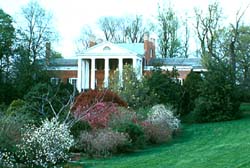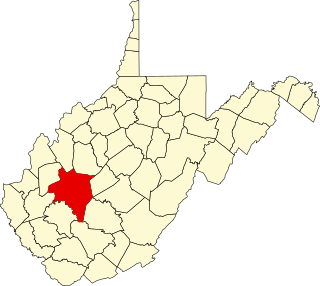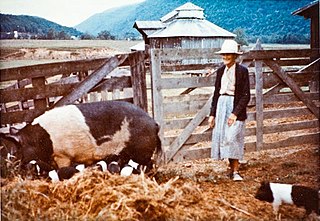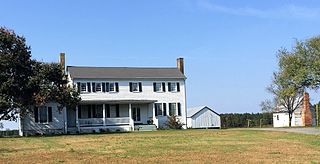
Courtland is an incorporated town in Southampton County, Virginia, United States. It is the county seat of Southampton County.

Oak Hill is a mansion and plantation located in Aldie, Virginia that was for 22 years a home of Founding Father James Monroe, the fifth U.S. President. It is located approximately 9 miles (14 km) south of Leesburg on U.S. Route 15, in an unincorporated area of Loudoun County, Virginia. Its entrance is 10,300 feet (3,100 m) north of Gilberts Corner, the intersection of 15 with U.S. Route 50. It is a National Historic Landmark, but privately owned and not open to the public.

Waterford is an unincorporated village and census-designated place (CDP) in the Catoctin Valley of Loudoun County, Virginia, located along Catoctin Creek. Waterford is 47 miles (76 km) northwest of Washington, D.C., and 7 miles (11 km) northwest of Leesburg. The entire village and surrounding countryside is a National Historic Landmark District, noted for its well-preserved 18th and 19th-century character.

Buildings, sites, districts, and objects in Virginia listed on the National Register of Historic Places:

Scotchtown is a plantation located in Hanover County, Virginia, that from 1771 to 1778 was owned and used as a residence by U.S. Founding Father Patrick Henry, his wife Sarah and their children. He was a revolutionary and elected in 1778 as the first Governor of Virginia. The house is located in Beaverdam, Virginia, 10 miles (16 km) northwest of Ashland, Virginia on VA 685. The house, at 93 feet (28 m) by 35 feet (11 m), is one of the largest 18th-century homes to survive in the Americas. In its present configuration, it has eight substantial rooms on the first floor surrounding a central passage, with a full attic above and English basement with windows below. It was designated a National Historic Landmark in 1965.

Piney Grove at Southall's Plantation is a property listed on the National Register of Historic Places in Holdcroft, Charles City County, Virginia. The scale and character of the collection of domestic architecture at this site recalls the vernacular architectural traditions of the eighteenth, nineteenth and twentieth centuries along the James River.

The Reynolds Homestead, also known as Rock Spring Plantation, is a slave plantation turned historical site on Homestead Lane in Critz, Virginia. First developed in 1814 by slaveowner Abram Reynolds, it was the primary home of R. J. Reynolds (1850-1918), founder of the R. J. Reynolds Tobacco Company, and the first major marketer of the cigarette. Upon liberation of the plantation in 1863, 88 people were freed from captivity and enslavement. It was later designated a National Historic Landmark in 1977. The homestead is currently an outreach facility of Virginia Tech, serving as a regional cultural center. The house is open for tours.

This is a list of the National Register of Historic Places listings in Albemarle County, Virginia.

This is a list of the National Register of Historic Places listings in Fairfax County, Virginia.

This is a list of the National Register of Historic Places listings in Botetourt County, Virginia.

This is a list of the National Register of Historic Places listings in Kanawha County, West Virginia.

This is a list of the National Register of Historic Places listings in James City County, Virginia.

This is a list of the National Register of Historic Places listings in York County, Virginia.

Temple Hall is an early 19th-century Federal-style mansion and working farm near the Potomac River north of Leesburg in Loudoun County, Virginia.

The Kuykendall Polygonal Barn was an early 20th-century polygonal barn in the South Branch Potomac River valley near Romney in Hampshire County, West Virginia. The Kuykendall Polygonal Barn was the only 15-sided barn built in West Virginia, and one of only a few such known to have been constructed in the United States. The barn utilized a number of sophisticated technological innovations not found in West Virginia's other round and polygonal barns. The Kuykendall Polygonal Barn was listed on the National Register of Historic Places on 9 July 1985.

This is a list of the National Register of Historic Places listings in Westmoreland County, Virginia.

This is a list of the National Register of Historic Places listings in Southampton County, Virginia.

Elm Grove, also known as the Williams-Rick House, is a historic plantation house located near Courtland, Southampton County, Virginia. The original section was built about 1790, and enlarged by its subsequent owners through the 19th century. The main section is a two-story, six-bay, frame dwelling sheathed in weatherboard. It has a side gable roof and exterior end chimneys. Three noteworthy early outbuildings survive. Directly north of the house is a single-story, one-cell frame building probably erected as an office and used at the turn of the century as a school.

Mahone's Tavern, also known as Kello's Tavern, Vaughn's Tavern and Howard's Hotel, is a historic inn and tavern located in Courtland, Southampton County, Virginia. It was built about 1796, and is a two-story, three-bay, gable-roofed, wood-framed structure with exterior gable end chimneys. A rebuilt hyphen and kitchen structure were added in 1933. In 1831, like nearly every standing building in Courtland, or Jerusalem at the time, it became a refuge and gathering place for local citizens during the slave uprising led by Nat Turner, known as Nat Turner's slave rebellion. The building was also the boyhood home of two persons who later achieved national prominence: Confederate General William Mahone and John J. Kindred, resident from 1859 to 1869, who later became a U.S. Senator from New York. It ceased being used as a tavern or hotel in 1901.

The Rochelle–Prince House is a historic home located at Courtland, Southampton County, Virginia. The original section dates to about 1814. The house consists of a 1 1/2-half-story, two-bay block attached to a two-story, three-bay block. The house was enlarged and remodeled between 1826 and 1827 and a rear ell was added about 1900.
























